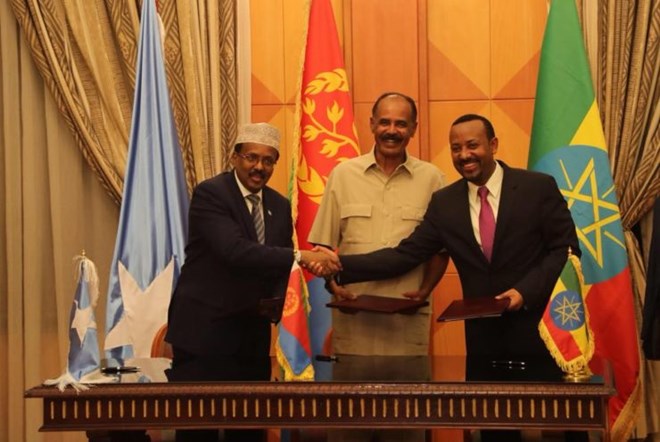
by Ali Hassan
Saturday September 15, 2018

In an article on Hiiran Online on 17 August 2018, I called on Eritrea, Ethiopia and Somalia who were working to bury the decade old enmity (Ethiopia and Eritrea) and the renewal of the strong ties that existed between Somalia and Eritrea to address the legitimate grievances of Djibouti’s territorial dispute with Eritrea. The Somali and Ethiopian leaders were actively working behind the scene to resolve the dispute which could derail any rapprochement between their countries. On 16 August, the Somali president paid a one-day visit to Djibouti and held fruitful discussions with President Guelleh and reassured him that Somalia will not forsake their brothers and sisters to enhance relations with Eritrea.
As a follow up on their mediation efforts, on 5 September, the three leaders (Eritrea, Ethiopia and Somalia) held a tripartite summit hosted by the Eritrean president in Asmara. At the end of meeting, the leaders issued a declaration that among other things agreed to: build close political, economic, social, cultural and security ties; work in coordination to promote regional peace and security and established a Joint High-Level Committee to coordinate their efforts in the framework of this Joint Declaration. In the build up to this declaration, the three leaders have established close rapport and trust rarely seen in regional politics.
Djibouti is mysteriously missing from the Joint Declaration
The euphoria and enthusiasm shown by the three leaders in their quest toward political, security and economic integration is short of the miracle one would expect. While the declaration mentions that the three countries “share close ties of geography, history, culture and religion as well as vital economic interests”, it fails to mention Djibouti or at least make a reference that once the issues between Djibouti and Eritrea is resolved, Djibouti will be an integral part in this new historical regional cooperation. The absence of Djibouti in this declaration calls into question the sincerity of the three leaders’ call for close cooperation. Nonetheless, it was reassuring that the Declaration reaffirmed the territorial integrity of all nations. It is not, however, clear where the disputed land between Eritrea and Djibouti falls.
Joint delegation of three foreign ministers visited Djibouti
While their Heads of State were still in Eritrea, the foreign ministers from Eritrea, Somalia and Ethiopia visited Djibouti on 7 September, one day after the leaders of the three countries issued a strongly worded Joint Declaration that promised close integration with no reference of Djibouti. The delegation was warmly received by their Djiboutian counterpart and held fruitful discussions that culminated in a courtesy call to President Guelleh. Eritrean Foreign minister published in his Twitter account that President Guelleh “is ready for reconciliation.” Ethiopian Prime Minister told the press that “the delegation will consult with Djibouti on how to resolve the border conflict with Eritrea peacefully.” Ethiopian Foreign minister also published in his Facebook page that Eritrea and Djibouti have agreed to normalize diplomatic relations, while the Eritrean Information Minister described it as the first initiative of a pledge by Ethiopia, Eritrea and Somalia to work in “coordination to promote regional peace and security.” There is conspicuous absence of the same spirit by the Djiboutian foreign minister who only stated that “with the truthful willingness demonstrated by Eritrea and Djibouti to make peace, all other pending issues will find their way to resolution.” One would hope that it would be the case.
The way forward
Djibouti shares the same culture, ethnic, history, geography, religion, economy and security parameters that Eritrea, Ethiopia and Somalia pledged to strengthen. It is also an oasis of peace and stability, the headquarters of the regional organization (IGAD), the center of gravity with Ethiopia and Somalia and have the same ethnic population with Eritrea and Ethiopia (Afar) and Somalia. Most important, Djibouti has been actively involved in the regional peacemaking efforts in the Darfur region of the Sudan, South Sudan, and spearheaded the first truly genuine reconciliation among the Somalis and continue to date.
Therefore, the absence of Djibouti in the Tripartite Declaration signed by the leaders of Eritrea, Ethiopia and Somalia calls into question as to how a country which is at the center of points stated in the Asmara Declaration could be left out. Is it a political miscalculation or a haste political maneuvers spearheaded by Eritrea or Ethiopia? Its intentions are not clear and could be seen as suspicious and without sincerity. One would hope that is not the case.
Moreover, the recent reconciliation between Eritrea and Ethiopia has had a domino effect for the rest of the Horn of Africa region. The leaders of the four countries, some from the old guard, and the new forward-looking ones should strive to change the old historical legacies and join forces to fight poverty and underdevelopment. That is where they should take the fight and with the human and natural resources endowed in these countries, it is only a matter of time before a real economic transformation will be achieved.
Once again, and as someone who is genuinely concerned and has an interest in the regional peace, stability and security, I would once again call on the leaders of the three countries to expand this noble effort of regional cooperation and invite Djibouti to play its rightful and natural place. Djibouti or Eritrea should hold a summit of the four Heads of State and finalize the remaining thorny issues between the two countries. Only then, would the populations of the Horn of Africa enjoy peace, security, regional integration, development that was once a pipe dream. That would be a true dawn for the Horn of Africa.
Ali Hassan
Former Senior United Nations Official, Writer and Analyst in the Region
Email: [email protected]